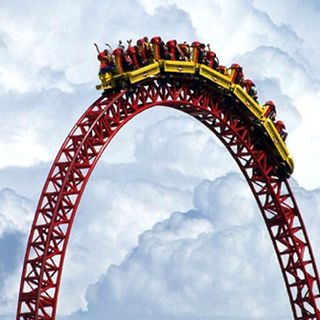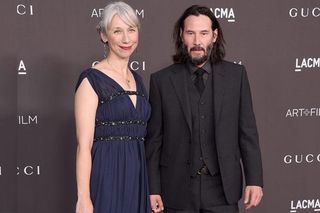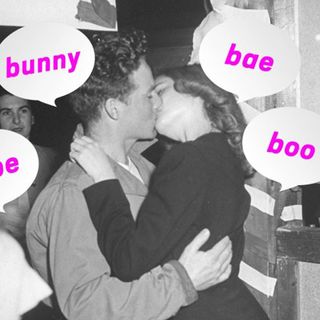
What Does It Mean to Look Your Age?
When artist Alexandra Grant sported naturally gray hair while accompanying actor Keanu Reeves on the red carpet, it took the world by storm.

When artist Alexandra Grant, 46, sported naturally gray hair while accompanying actor Keanu Reeves on the red carpet last week, it took the world by storm. Tweets expressed agog-ery. Articles marveled that the actor was with a woman “his own age.” (Grant is nine years younger than Reeves.) Major news outlets upheld the artist for her authenticity in “looking her age.”
But what does it mean to look one’s age?
At face value, looking one’s age is inevitable — you are the age you are and you look the age you look. Within society, however, it’s a consensus on the average. If we observe most people of a certain age around us looking a certain way, then that is our interpretation of how an age should look.
The problem is, this interpretation of ‘should’ is almost always punishing to women because it’s driven by a global, US$50.2 billion anti-aging industry that trains women to see any sign of aging as a personal failing. This industry, of course, has its roots in a human history that prizes women for their youthful beauty more than anything else. Outside of the modern era, it’s difficult to find female historical figures who were valued for something other than physical beauty.
Little wonder, then, how anti-aging desperation has been deeply inculcated in so many women. And nowhere is the fight to keep wrinkles and gray hair at bay fiercer than on the red carpet. Celebrity women, well aware that roles and opportunities dry up after age 35 (incisively skewered by Amy Schumer’s “Last Fuckable Day“), invest heavily in retaining the youthful appearance upon which their career was originally built. In a social media world that gives us as much exposure to celebrities as to our nearest and dearest, this skews our understanding of the average. No longer are we determining how women of any given age should look like by observing the people around us; we’re determining how women of any given age should look by overexposure to women who are forced to invest, in order to maintain their careers and livelihoods, in maintaining an ever-younger appearance.
Which is what makes Alexandra Grant such a standout. It’s not because she ‘looks her age.’ (At 46, Grant has a fully gray head of hair; roughly only 50% of people by age 50 have a half-gray head of hair, according to Dr. Michael Eidelman, medical director of Chelsea Skin & Laser and an assistant professor of dermatology at Icahn School of Medicine at Mount Sinai). It’s because Grant has unabashedly owned signs of aging — signs of aging associated with people much older than herself, even — in a context where most women do everything to hide them.
And more importantly, while doing so, a man appeared at her side, affectionately holding her hand, suggesting to a society hardwired to devalue women beyond a certain age that she might — just might — be fuckable after all.
Related on The Swaddle:
“Keanu Reeves’s Lady Friend Has Given Me the Courage to Turn 40,” ran a headline on The Cut not long after Grant’s appearance — as if turning 40 is something women can avoid if we’re fearful enough (and buy enough products and services). As if turning 40 means we change in some fundamental, fatal way.
But the thing is, we do. A recent analysis of the barriers women face in the workplace identified age as a bigger inhibition to success than gender. While research is split as to whether biases against older workers affect women more than men, there’s no denying outside of the office, the forces of ageism hit women harder — especially women who work on the red carpet.
Since turning 40, Dr. Sheetal Desai has routinely been mistaken by both men and women for being 10 years younger than she is. The 47-year-old, who splits her time between Mumbai and Vapi, Gujarat, credits her good genes; her grandmother at age 96 had few wrinkles, she says, and her 78-year-old mother also looks young for her age.
But she also credits her outlook on life. “I’m living my life. I’m happier [than ever]. I do whatever I want. I travel whenever I want. I follow my passions. I’m a doctor, but I always wanted to be an actor, so I started my acting career three years back, at age 44,” she says.
In a patriarchal society, this kind of independence and self-fulfillment is unusual for women, who are conditioned to devote themselves to family life at the expense of everything else. “Women suppress themselves in quite a lot of contexts and that also shows on their faces,” Desai says. Often, when female peers tell her she looks younger than her age, it’s said wistfully. “Sometimes they have this feeling — we wish we could do what you’re doing,” she says.
The reaction from men, however, is different. Her youthful appearance helps her get dates, says Desai, who is single. “But when I tell them my real age – because I don’t want to hide anything — then they withdraw. They won’t go for serious relationships if you’re 40-plus, because they think you’re too old. Even if the guy is only two or three years younger.”
Men “don’t take you seriously,” when they find out your real age, she says.
The ability to be taken seriously seems to be a narrow window for women. Bangalore-based Devika Tripathi, 29, is five-foot-two-and-a-half. All her life she’s been told she looks much younger than her age. As a college student at age 18, she would routinely hear that she looked 12 or be denied services like eyebrow threading. At 25, she would still be carded to get into pubs. At 26, she started a new job, and her new coworkers refused to believe she was older than 18.
Over the years, Tripathi has changed hairstyles and discarded clothes she thought make her look younger. Until recently, she took these comments to heart and worried she’d never be considered a credible professional.
“It doesn’t look like a compliment to me when people would say that,” she says. “It’s sort of demeaning. … You want to be taken seriously.”
And that, perhaps, is what Alexandra Grant — in the full glory of her gray hair and natural beauty sweeping through a context where artificial youth is prized and female aging, punished — represents most: not a woman who looks her age, but a woman taken seriously — by the man holding her hand, by the public taking and marveling at her photo, but perhaps most of all, by herself.
Liesl Goecker is The Swaddle's managing editor.
Related


Study: 1 in 7 Schoolgirls Sexually Harassed, Assaulted By Peers
